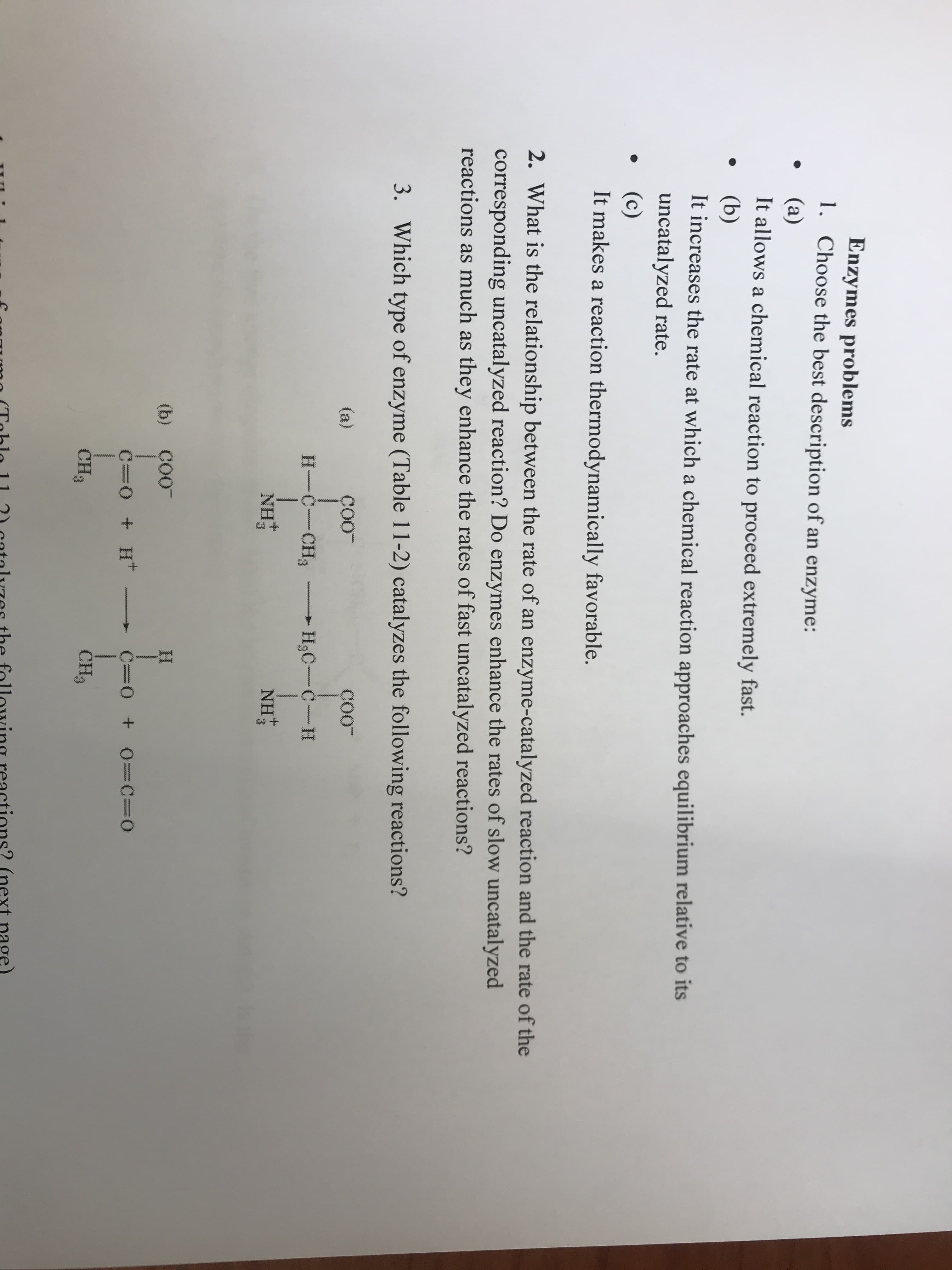Enzymes problems 1. Choose the best description of an enzyme: It allows a chemical reaction to proceed extremely fast. It increases the rate at which a chemical reaction approaches equilibrium relative to its uncatalyzed rate. It makes a reaction thermodynamically favorable. 2. What is the relationship between the rate of an enzyme-catalyzed reaction and the rate of the corresponding uncatalyzed reaction? Do enzymes enhance the rates of slow uncatalyzed reactions as much as they enhance the rates of fast uncatalyzed reactions? 3. Which type of enzyme (Table 11-2) catalyzes the following reactions? COO соо- NH NH3 (b) Coo CH3 CH3 (ToLIA 1 I ?) ootakr as the following reactions? (next naơe)
Enzymes problems 1. Choose the best description of an enzyme: It allows a chemical reaction to proceed extremely fast. It increases the rate at which a chemical reaction approaches equilibrium relative to its uncatalyzed rate. It makes a reaction thermodynamically favorable. 2. What is the relationship between the rate of an enzyme-catalyzed reaction and the rate of the corresponding uncatalyzed reaction? Do enzymes enhance the rates of slow uncatalyzed reactions as much as they enhance the rates of fast uncatalyzed reactions? 3. Which type of enzyme (Table 11-2) catalyzes the following reactions? COO соо- NH NH3 (b) Coo CH3 CH3 (ToLIA 1 I ?) ootakr as the following reactions? (next naơe)
Chemistry: Principles and Reactions
8th Edition
ISBN:9781305079373
Author:William L. Masterton, Cecile N. Hurley
Publisher:William L. Masterton, Cecile N. Hurley
Chapter11: Rate Of Reaction
Section: Chapter Questions
Problem 88QAP
Related questions
Question
1-3

Transcribed Image Text:Enzymes problems
1. Choose the best description of an enzyme:
It allows a chemical reaction to proceed extremely fast.
It increases the rate at which a chemical reaction approaches equilibrium relative to its
uncatalyzed rate.
It makes a reaction thermodynamically favorable.
2. What is the relationship between the rate of an enzyme-catalyzed reaction and the rate of the
corresponding uncatalyzed reaction? Do enzymes enhance the rates of slow uncatalyzed
reactions as much as they enhance the rates of fast uncatalyzed reactions?
3.
Which type of enzyme (Table 11-2) catalyzes the following reactions?
COO
соо-
NH
NH3
(b) Coo
CH3
CH3
(ToLIA 1 I ?) ootakr as the following reactions? (next naơe)
Expert Solution
This question has been solved!
Explore an expertly crafted, step-by-step solution for a thorough understanding of key concepts.
This is a popular solution!
Trending now
This is a popular solution!
Step by step
Solved in 4 steps

Knowledge Booster
Learn more about
Need a deep-dive on the concept behind this application? Look no further. Learn more about this topic, chemistry and related others by exploring similar questions and additional content below.Recommended textbooks for you

Chemistry: Principles and Reactions
Chemistry
ISBN:
9781305079373
Author:
William L. Masterton, Cecile N. Hurley
Publisher:
Cengage Learning

Chemistry & Chemical Reactivity
Chemistry
ISBN:
9781337399074
Author:
John C. Kotz, Paul M. Treichel, John Townsend, David Treichel
Publisher:
Cengage Learning

Chemistry
Chemistry
ISBN:
9781305957404
Author:
Steven S. Zumdahl, Susan A. Zumdahl, Donald J. DeCoste
Publisher:
Cengage Learning

Chemistry: Principles and Reactions
Chemistry
ISBN:
9781305079373
Author:
William L. Masterton, Cecile N. Hurley
Publisher:
Cengage Learning

Chemistry & Chemical Reactivity
Chemistry
ISBN:
9781337399074
Author:
John C. Kotz, Paul M. Treichel, John Townsend, David Treichel
Publisher:
Cengage Learning

Chemistry
Chemistry
ISBN:
9781305957404
Author:
Steven S. Zumdahl, Susan A. Zumdahl, Donald J. DeCoste
Publisher:
Cengage Learning

Chemistry for Today: General, Organic, and Bioche…
Chemistry
ISBN:
9781305960060
Author:
Spencer L. Seager, Michael R. Slabaugh, Maren S. Hansen
Publisher:
Cengage Learning

Introductory Chemistry: A Foundation
Chemistry
ISBN:
9781337399425
Author:
Steven S. Zumdahl, Donald J. DeCoste
Publisher:
Cengage Learning

Introduction to General, Organic and Biochemistry
Chemistry
ISBN:
9781285869759
Author:
Frederick A. Bettelheim, William H. Brown, Mary K. Campbell, Shawn O. Farrell, Omar Torres
Publisher:
Cengage Learning